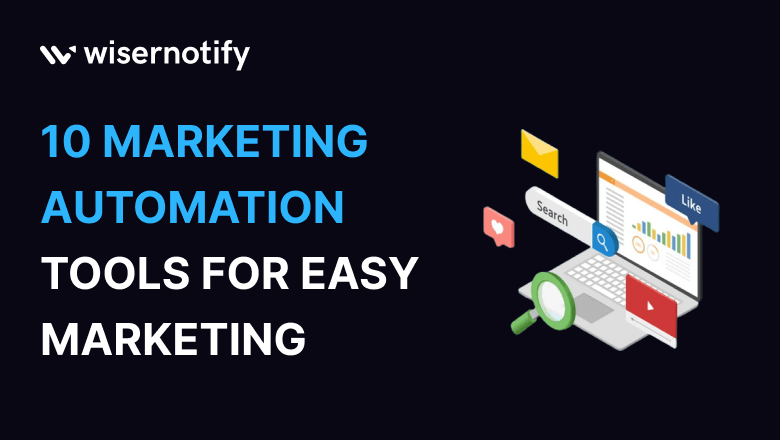What if there are some tools to simplify your process? Or Marketing Automation Tools that can do your repetitive tasks altogether?
Whether email marketing, content marketing, social media marketing, or sales pipeline, automation tools can help get better results.
56% of businesses currently use marketing automation tools, and 40% of B2B companies plan to adopt them.
Adding marketing automation tools can help streamline processes, simplify workflows, automate marketing campaigns, lead nurturing, and boost conversion rate.
But, with the hundreds of tools available in the market, which is the best marketing automation software?
Which will help your business grow and be best for your marketing and sales teams?
In this post, we’ll briefly explain marketing automation and recommend the ten best marketing automation platforms for boosting your marketing efforts.
First, let’s understand marketing automation and its importance to your business.4
Start Free Trial
Highlight real-time activities like reviews, sales & sign-ups.
What is Marketing Automation?
Marketing automation uses tools and software to help businesses streamline the process by automating repetitive tasks, such as email campaigns, ad campaigns, SMS marketing, tracking, analytics, and many more.
For example, brands could create automated email marketing campaigns that can help send emails to the segmented target audience, coupon codes, and any new product launches/events and invite email subscribers to visit a website.
Tools like Mailchimp have evolved from simple email marketing tools into comprehensive marketing automation solutions, offering expanded features and flexible pricing structures.
Marketing automation is not a strategy you can ignore; it’s critical to improving your strategy on different marketing channels. In short, marketing automation platforms can save you Time and money and improve marketing efficiency.
Now, let’s dive into the best marketing automation software.
Here’s a quick summary of the tools covered in this article:
- Ontraport: CRM and automation tool with a visual campaign builder, email marketing, and powerful analytics.
- GetResponse: Email marketing solution with autoresponders, landing pages, and comprehensive marketing automation.
- Keap: All-in-one CRM and marketing software for small businesses with customizable email templates and automation.
- LeadSquared: Integrated platform for marketing and sales automation, lead management, and personalized email campaigns.
- Trapica: AI-powered tool for automating and optimizing digital advertising campaigns across multiple platforms.
- Adobe Marketo Engage: Comprehensive B2B and B2C marketing automation platform with cross-channel engagement and lead management.
- WebEngage: Retention and marketing automation platform with advanced segmentation, omnichannel engagement, and analytics.
- Clevertap: Customer engagement and retention platform with audience analytics, omnichannel engagement, and campaign optimization.
- Eloqua: Cloud-based platform for B2B and B2C marketers to drive personalized and targeted marketing campaigns.
- EngageBay: Marketing automation platform for small-to-medium-sized businesses with email marketing, social media management, and lead scoring.
Must Check : 10 Impactful eCommerce Marketing Automation Strategies
Top 10 Marketing Automation Tools for Your Business
Several powerful tools are available for marketing automation, which can benefit your marketing efforts.
But which tools are best?
To give you an idea, we’ve compiled a list of the top 10 marketing automation tools to help your business grow. These tools offer a variety of features, use cases, and pricing options, making them invaluable for tasks such as email cycles, message personalization, social media posting, SEO keyword research, and lead qualification.
1. Ontraport
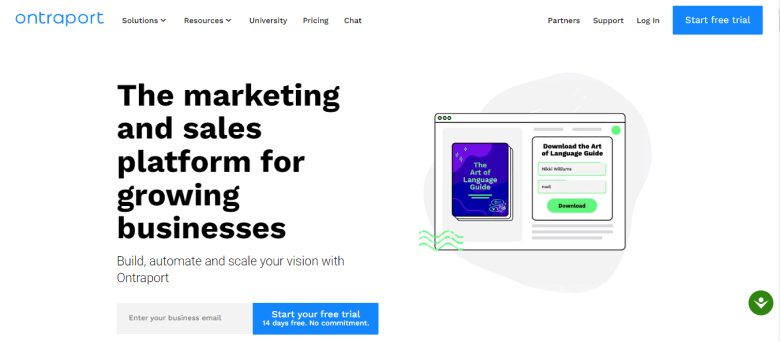
Ontraport is a sales and marketing platform that helps your business build, automate, and scale its marketing campaign efforts with minimum effort.
It is a popular CRM and automation tool with a 4.5-star rating on G2 and a 4-star rating on Capterra.
In addition, it offers several business features, such as powerful CRM, payment processing, one-click WordPress integration, email marketing, membership sites, affiliate management, marketing automation, reporting, landing pages, and more.
Further, the marketing automation features offer a visual campaign builder that allows businesses to create marketing automation workflows or use ready-to-go proven marketing campaigns.
The tasks involve:
- Sending follow-up emails.
- Assigning tasks to teams.
- Triggering specific actions based on customer engagement and behavior.
The Ontraport system is easy to set up using Wizard within minutes, with instant access to a library of proven funnels, campaigns, and follow-up systems.
It has a robust analytics and reporting feature to track the performance of marketing campaigns and gain insights into customer behavior to optimize your marketing strategies.
Features:
- Allows businesses to create and automate personalized email campaigns.
- In-built CRM capabilities to help manage leads, contacts, and customer data.
- Easy drag-and-drop editor to build marketing campaigns.
- Create professional landing pages and forms to capture leads.
- Integrate with different platforms, such as Zapier, Shopify, PlusThis, Zoom, Stripe Connect, QuickBooks, Xero, Calendly, WordPress, Google Calendar, Lead Pages, and many more.
- Communicate with your customers through email and SMS messages.
Pros:
- Huge range of features.
- Proper multiple channels marketing.
- Highly segmented reporting.
- Great customer support.
- Highly scalable.
Cons:
- A limited number of integrations.
- The dashboard could be more intuitive.
- No social media integration.
Pricing: Starts at $29/month
Also Read : 7 Effective Marketing Automation Strategy with Examples
2. GetResponse
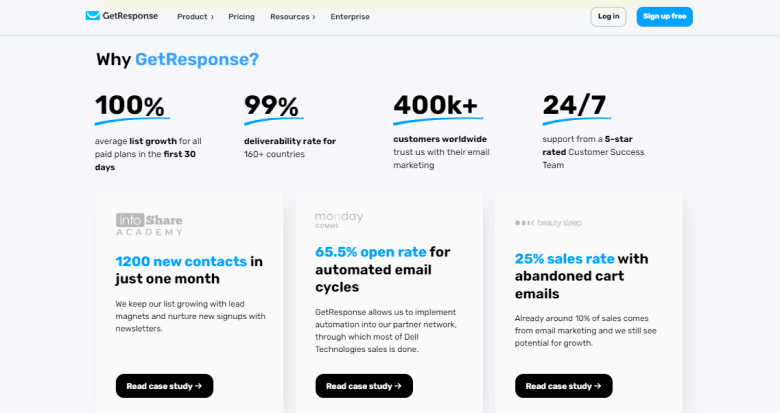 GetResponse is an excellent email marketing solution with a 4.2-star rating on Capterra and G2. It includes pro features like email marketing, autoresponder, website builder, marketing automation, SMS marketing, Web push notifications, conversion funnels, and Live chats.
GetResponse is an excellent email marketing solution with a 4.2-star rating on Capterra and G2. It includes pro features like email marketing, autoresponder, website builder, marketing automation, SMS marketing, Web push notifications, conversion funnels, and Live chats.
Selecting the appropriate digital marketing automation tools is crucial for evolving marketing strategies. These tools help businesses minimize Time spent on intricate details and focus more on growth.
It is an affordable email marketing automation tool with features like drip campaigns, contact scoring, event-based automation, eCommerce tracking, and more.
In addition, the marketing automation feature helps you build a personalized automation workflow or choose from prebuild ones to engage and guide your customers at every step.
You can track and rate customers’ actions to create custom segments based on specific data and criteria, using unlimited tags and engagement scores. You can also add points for each action.
Further, you can send personalized and relevant emails to your segmented contacts to run targeted and automated email marketing campaigns.
Additionally, GetResponse allows the creation of visually appealing landing pages and forms with an easy drag-and-drop builder, hosting webinars, managing leads and contacts, scheduling and publishing social media posts, and seamless integration with various third-party tools.
Features:
- Create automation events based on customer behavior.
- 500+ Ready-made templates.
- Trigger relevant emails, web pushes, or SMS based on user behavior and data.
- Increase subscription rates with custom opt-in prompts, bring-back sites, and cart abandoners.
- Create popups, banners, and bars to catch customers’ attention.
- Improve customer support with direct chats in emails, landing pages, and websites.
- Automate SMS marketing and include trigger-based SMS campaigns.
- Seamless integration with popular platforms like Shopify, Landingi, Zapier, Integrately, Apix-Drive, YouTube, Twitter, Facebook pages, and many more.
Pros:
- Live chat for websites
- Social media and Google ads feature
- Email list automation
- Design and spam testing
- 100+ Seamless Integration
Cons:
- Email automation available on premium plans
- No scoring deliverability
Pricing: Free
Also See: 18 Top Conversion Rate Optimization Tools
3. Keap – Best Marketing Automation Tool
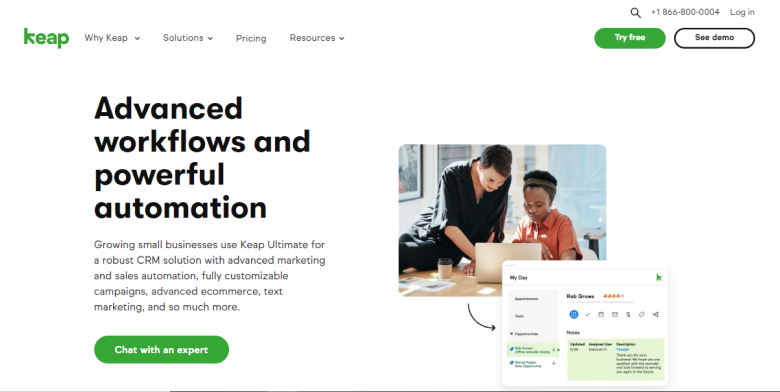
- Keap – Best Marketing Automation Tool
Keap – Best Marketing Automation Tool
Keep is an all-in-one marketing and CRM software that helps small businesses collect more leads, convert them to clients, and turn those clients into fans.
Formerly known as Infusionsoft, it offers a range of features to streamline sales and marketing efforts, automate workflows, and improve customer engagement.
Keap has a 4.2-star rating on G2 and a 4.1-star rating on Capterra, making it another popular marketing tool that offers flexibility to meet your business’s needs.
Its centralized CRM platform allows businesses to store and manage customer data, track customer interactions, store contact information, set reminders, and manage tasks.
Further, marketing automation features help businesses automate repetitive marketing tasks and nurture leads, making the lives of the marketing team easier.
It offers customizable email templates, campaign builders, and automation rules to deliver targeted messages, follow-ups, and personalized communication based on customer behavior.
You can choose prebuilt templates or start custom automation templates to send professional email campaigns to your subscribers.
In addition, you can create customizable lead capture forms and landing pages to capture and convert leads.
You can also manage sales pipelines by tracking leads, deals, and opportunities.
The analytics and reporting features can help you track the performance of marketing campaigns, email engagement, sales activities, and revenue generation.
Features:
- Enables businesses to track customer interactions, store contact information, set reminders, and manage tasks using the CRM platform.
- Automate repetitive tasks and nurture leads with customizable templates and marketing automation.
- Create customized landing pages and forms to capture and convert leads into customers.
- Manage sales pipelines, automate follow-up tasks, and remind to ensure timely lead conversion.
- Built-in appointment scheduling feature to enable businesses to schedule and manage meetings.
- Provide customer support through phone, chat, and emails.
Pros:
- Easy-to-use platform.
- 24/7 Customer Support and Customer Success Manager is available.
- Automatically collect and score leads.
- Offers a 14-day free trial.
Cons:
- Steep learning curve
- Pricing might high
- Limited customize option
Pricing: $149/per month
Must Check : 15 Inspiring Marketing Automation Examples
4. LeadSquared
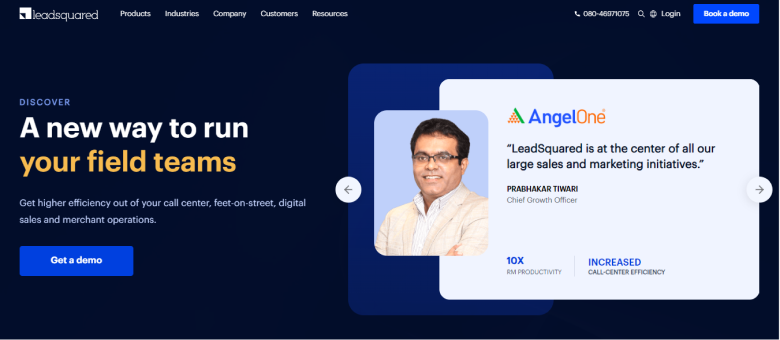
With a 4.3-star rating on Capterra and a 4.6-star rating on G2, it is a top marketing automation and CRM tool and a complete customer acquisition platform for businesses.
Leadsquared is an integrated automation platform for marketing and sales teams. It is a comprehensive marketing automation solution that offers a wide range of features to streamline marketing and sales processes.
It is an all-in-one platform with unique features like Sales execution CRM, Sales automation, Marketing automation, Field team tracking, merchant/vendor onboarding, and Sales performance management.
It helps accelerate the lead-capturing process with automation, smooth sales operations, and lead nurturing.
Lead management automation allows you to capture, score instantly, and route leads to the right team.
It helps to create personalized email campaigns, automate follow-ups, and deliver targeted content based on audience behavior and segmentation.
In addition, you can engage with your audience through SMS, emails, and drip campaigns and track their activities across all touchpoints, such as blogs, websites, online ads, emails, and phone calls.
Further, the CRM system centralizes customer data and interactions, allowing businesses to store and manage contact information, track interactions, and set follow-up reminders.
It also offers email marketing capabilities to create and send targeted email campaigns with customizable templates, personalization options, and automation workflow.
Features:
- Capture leads from various sources, like websites, landing pages, social media, and offline channels.
- Create personalized email campaigns, automate follow-ups, and deliver targeted content based on lead behavior.
- Manage sales processes, track opportunities with tools, and streamline your sales pipelines.
- Created visually appealing landing pages and forms using drag-and-drop editors, designed templates, and A/B testing to optimize them.
- Generate custom reports to measure pieces of every process, from campaign spending and performance reports to sales closure rates.
- Build trigger-based prospect communication workflows for omnichannel.
- Effortless integration with popular apps like Google, GoToWebinar, Zapier, CallRail, Zopim, and many other third-party apps.
Pros:
- Personalized email automation.
- Integrate with popular third-party apps.
- Build landing pages and website popups.
- Elaborate lead generation and nurturing sequences.
Cons:
- The learning curve might be difficult.
- High Pricing might be another factor.
- It might get slow sometimes.
Pricing: Starts at $400 per month
Start Free Trial
Highlight real-time activities like reviews, sales & sign-ups.
Also Read: 13 Key Benefits of Marketing Automation for Your Business
5. Trapica
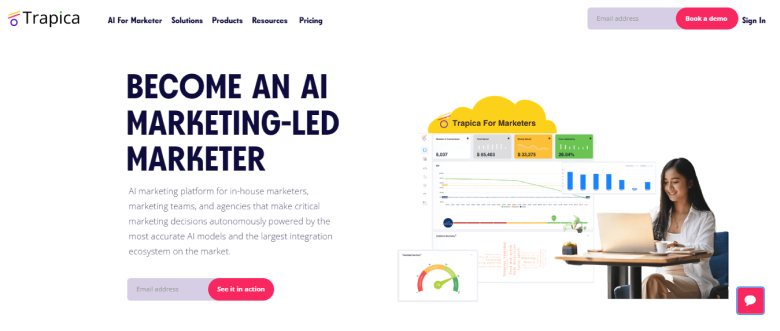
Trapica provides a single platform for marketers and brands to simplify and automate marketing campaigns while providing intelligent insights about your brand’s audiences and competitors.
In addition, AI tools like autonomous help you target the right audiences and automate every aspect of your campaign based on real-time data to ensure better performance and efficiency.
In addition, it provides full automation that automates every aspect of your campaigns without any manual touch or pre-definitions.
It leverages advanced algorithms and machine learning techniques to automate and enhance your campaigns across social, search, and DSP channels.
It automatically scores your ad creatives before and during campaigns to understand which creatives work best and which need improvement.
Further, the tool takes the real-time data of your running campaigns and identifies the most effective combinations to maximize engagement and drive better campaign results through marketing automation workflows. These workflows allow for personalized automated email and SMS marketing management, audience segmentation, and predictive email sending.
The tool also helps to optimize budget allocation across different ad sets and campaigns based on performance data and prioritize higher-performing campaigns and target segments.
It provides AI-driven insights and suggestions for campaign optimization.
Features:
- Automates creation and management of your digital advertising campaigns across multiple platforms.
- AI algorithm helps to analyze data and identify the high-performing target segments.
- Improve ads and creative posts to optimize and get maximum engagement on campaigns.
- Automates campaign budgets across different ads and campaigns based on performance data.
- Real-time performance tracking and reporting campaign performance metrics, monitoring key performance indicators and return on Ad spend.
Pricing: On Request
6. Adobe Marketo Engage – Best Marketing Automation Tool
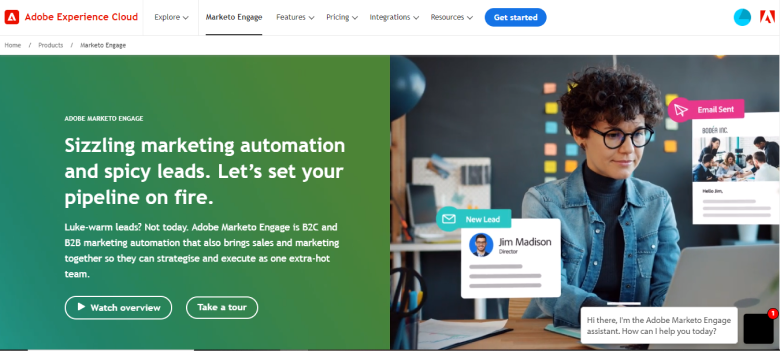
Adobe Marketo Engage – Best Marketing Automation Tool
With a 4.1-star rating on G2 and a 4.2-star rating on Capterra, it is another famous software brand in the World.
It is a comprehensive B2B and B2C marketing automation platform designed to help businesses drive more customer engagement and generate leads.
Selecting the right digital marketing automation tools is crucial for evolving marketing strategies, as they help businesses minimize Time spent on intricate details and focus more on growth.
It is a leading automation tool that helps to streamline lead management, cross-channel engagement, and multi-touch marketing attribution.
Further, the tool helps you to acquire, retain, and grow your high-value accounts with advanced audience building, smart nurturing, and marketing automation.
It saves time by automating marketing campaigns and offers drag-and-drop visual workflows, email marketing automation, personalized content delivery, and campaign scheduling features to deliver targeted messages to the right audience at the right Time.
Marketo evaluates every touchpoint along the customer’s journey and identifies the best-performing campaigns, channels, and posts. This can help you focus on your performance and maximize your efforts.
Further, the market offers services like mobile marketing, consumer marketing, digital advertising, customer base marketing, lead management, marketing AI, and analytics & reporting.
Features:
- Coordinate engagement across different channels, both online and offline.
- Connect with customers through social platforms, emails, mobile marketing, digital advertising, and using chatbots to maximize conversions.
- Offers deep insights into buyer behavior, delivers personalized cross-channel campaigns, and connects with the right audience using AI-powered audience segmentations.
- Deliver personalized content on the website and inboxes with a predictive-powered AI content personalization tool.
Pros:
- Automation features to reduce manual tasks
- Good customer support
- One place for all your PPC campaigns, SEO, and social media lead management.
- Email automation, Cross-channel, and digital advertisement.
Cons:
- Steep learning curve
- The interface might feel hard to navigate
Pricing: Price on Request
7. WebEngage

Web Engage is rated 4.5 stars on Capterra and G2, making it one of the best retention and marketing automation platforms.
It offers various options to connect with your customers through email marketing, SMS marketing, WhatsApp marketing, Push notifications, Facebook retargeting, Google ads, Web Personalization, and In-app notifications.
It allows you to build customer engagement workflows by setting triggers, creating actions, checking conditions, and introducing flow control with an intuitive drag-and-drop journey.
In addition, it provides deeper insights into your customer’s behavior data with dynamic funnels, cohorts, and real-time analytics at your fingertips.
Further, you can precisely segment your target audience using real-time user information and behavioral data, making it easier for your marketing team to optimize customer experiences.
You can also create customer—and business-triggered workflows based on how customers interact with your brand or send personalized content about your new events, products, or updates.
You can also create personalized web experiences using customized web pages, notifications, and surveys, as well as a mobile app to provide a unique customer experience.
Features:
- Engage with customers across multiple channels, including email, mobile push notifications, SMS, in-app messaging, web push notifications, and on-site notifications.
- Automate your workflow based on customer and business-triggered behavior.
- Advanced reporting and analytic behaviors that offer insights into customer behavior, engagement, and campaign performance.
Pricing: Available on request
Related read: 10 Impactful Push Notification CTA Examples to Use in 2024
8. Clevertap
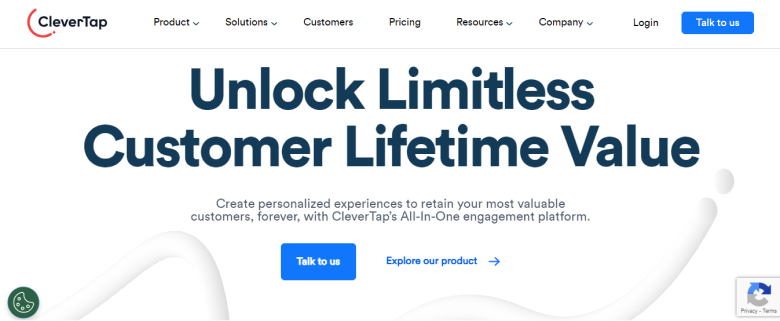
Clevertap is a customer engagement and retention platform that helps businesses build personalized and meaningful customer experiences.
It combines audience analytics, omnichannel engagement, and product A/B testing to deliver a truly personalized experience.
It helps to segment users based on historical data or target them based on their behavior, demographics, preferences, and in-app actions.
That helps you to create highly personalized messages and campaigns for your segmented target audience.
Further, it allows you to engage with your audience through various channels, including in-app messages, push notifications, SMS marketing, WhatsApp messages, app inbox, Emails, and web messaging.
You can even build and deliver omnichannel campaigns based on user behavior, location, and life-cycle stage.
This tool lets you map out and automate the entire user journey through marketing automation workflows, ensuring that users receive relevant messages.
This includes onboarding campaigns, abandoned cart reminders, personalized recommendations, re-engagement campaigns, and more.
CleverTap enables businesses to automate their marketing campaigns based on predefined triggers and user actions.
You can even do A/B testing of different campaign elements and then automatically serve up the best-performing versions.
Features:
- All-in-one solution for data management, analytics, advanced segmentation, omnichannel engagement, campaign optimization, and personalization.
- Easy to use and build campaigns with a drag-and-drop interface.
- Engage with your users across different channels, including mobile, email, web, and other platforms.
- A/B testing of different elements of your campaigns and optimizing them.
- Create cohorts based on user attribution or user behavior and analyze their performance.
Pros:
- Easy to use
- Multichannel engagement
- Advanced segmentation
- Advanced analytics and insights
- A/B testing and optimization
Cons:
- Steep learning curve
- Hidden charges
- Might work slow
Pricing: Basic starts at $99/month
9. Eloqua
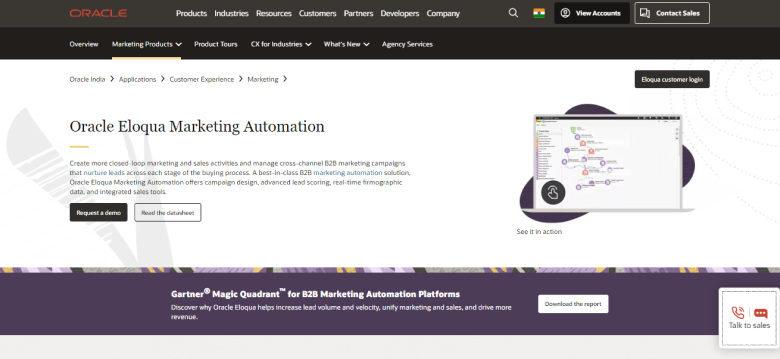
Eloqua has a 3.9-star rating on G2, making it a popular cloud-based platform for B2B and B2C marketers to help them target customers across all marketing channels.
Eloqua is a comprehensive marketing automation solution designed to help businesses drive personalized and targeted marketing campaigns.
It offers comprehensive tools and features to automate marketing activities, nurture leads, and analyze campaign performance.
Eloqua provides a centralized platform for managing and executing marketing campaigns.
It enables businesses to create, schedule, and track various types of campaigns, such as email marketing, social media marketing, content marketing, and more.
Further, it helps segment target audiences precisely based on specific attributes, interests, and geography.
Advanced intelligence helps you scale efficiencies in scaling the right audiences, engaging customers with relevant emails at the right Time, and delivering a better customer experience.
It offers robust analytics by accurately tracking and measuring business impact with detailed marketing reports and dashboards.
You can monitor overall system health, campaign activity, email performance, and custom account analysis to make the right decision.
Features:
- Centralized platform for managing and executing marketing campaigns.
- Nurture leads with automated workflows and personalized content.
- Create dynamic campaigns to provide personalized experiences at every customer journey stage.
- Automate lead scoring that updates in real-time across multiple campaigns and business lines.
- Identify, prioritize, and track high-value opportunities across the sales cycle.
Pros:
- Wide range of features.
- Robust segmentation and personalized capabilities.
- Design to meet your growing business.
- Access to 500 prebuilt and vetted integrations.
Cons:
- Steep learning curve
- Limited features to reach customers
Pricing: Available on request
10. EngageBay
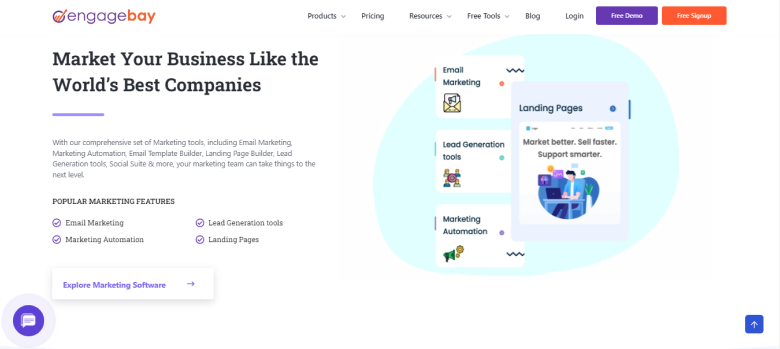 Engagebay is rated 4.6 stars on G2 and Capterra, making it a popular marketing automation platform for small—to medium-sized businesses.
Engagebay is rated 4.6 stars on G2 and Capterra, making it a popular marketing automation platform for small—to medium-sized businesses.
It helps automate all marketing and sales tasks, customer service workflows, lead generation, and lead nurturing.
The tool helps maximize efficiency, growth, and ROI for marketing by automating the process across all departments, making it one of the best marketing automation tools available.
It has many features, including email marketing, social media management, and website chat.
In addition, using a drag-and-drop visual builder, you can design your marketing and sales workflows within minutes.
The tool also allows you to set up email sequences and auto-send the emails as per the defined schedule, giving you free Time to close your leads.
The automatic lead scoring process ensures you spend less Time on qualifying leads and set up triggers that automatically increase/decrease the lead scores based on individual activities.
Further, you can set up rules to automatically segment customers based on behavior, such as email opens, clicks, actions taken, etc.
It has email marketing automation tools that can help nurture your leads to send personalized emails. You can even track customer behavior and set up excellent web forms to engage casual web visitors and convert them into happy customers.
Features:
- Marketing and sales automation to streamline marketing, sales, and support with a single software.
- Design unlimited landing page design with advanced builders.
- Drip email campaigns with email broadcasts, sequences, and an email builder.
- Automate lead score to ensure you spend less Time finding leads.
Pricing: Free version available
Simple Steps to Choose the Right Marketing Automation Tool for Your Business
Choosing the right marketing automation tool for your business requires carefully considering and evaluating your needs and goals. Here are some key factors to consider when selecting a marketing automation tool:
- Define Your Goals: Clearly define your marketing objectives and goals. Identify what you want to achieve with marketing automation: lead generation, lead nurturing, customer engagement, or improving conversion rates.
- Assess Features and Functionality: Evaluate the features and functionalities offered by different marketing automation tools. Consider features like email marketing, lead management, CRM integration, automation workflows, analytics, social media management, and the option to set up DMARC records and e-commerce capabilities. Determine which features are essential for your business’s growth. Reviewing the best marketing automation platforms can help you identify tools that streamline repetitive marketing tasks, provide valuable data insights, and ultimately lead to less billable Time wasted, more business, and happier clients.
- Scalability and Growth Potential: Consider the marketing automation tool’s scalability. Assess whether it can accommodate your growing business needs, handle increasing volumes of data, and support expanding your marketing efforts.
- Integration Capabilities: Determine if the marketing automation tool integrates seamlessly with your existing systems and tools, such as CRM software, e-commerce platforms, content management systems, and analytics tools. Seamless integration ensures data synchronization and workflow efficiency across different platforms.
- Ease of Use: Consider the user-friendliness and ease of use of the marketing automation tool. Look for intuitive interfaces, drag-and-drop editors, and easy-to-understand workflows. A user-friendly tool will help your team quickly adapt to the platform and maximize its capabilities.
- Pricing and Budget: Evaluate the pricing structure of the marketing automation tools. Consider your budget and determine whether the tool’s pricing aligns with your financial resources. Consider the cost of additional features, scalability options, and ongoing support and maintenance.
- Customer Support: Assess the marketing automation tool provider’s customer support and training level. Look for resources such as documentation, tutorials, webinars, and responsive customer support channels. Adequate support and training are essential for maximizing the tool’s potential and resolving any issues that may arise.
Conclusion
Marketing automation tools have revolutionized the way businesses approach their marketing efforts. The wide range of options available has made streamlining and optimizing marketing campaigns easier.
The ten marketing tools we have listed have unique features and functionalities to meet your business’s diverse needs.
These tools include email marketing tools, marketing automation capabilities, time savings, improved efficiency, enhanced targeting and personalization, comprehensive analytics of your marketing data, and seamless integration with other systems.
They empower businesses to automate repetitive tasks, nurture leads, engage with customers across multiple channels, market cloud account engagement, improve customer relationships and contact management, and analyze campaign performance for better decision-making.
By choosing the right tool and utilizing its features effectively, businesses can streamline workflows, drive engagement, nurture leads, improve marketing strategy, analyze sales data & sales revenue, and ultimately quickly achieve their marketing goals.
